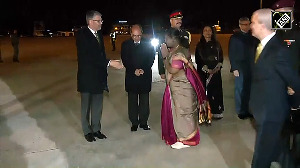With Bangladesh set to try the 1971 war "criminals", Pakistan has said a tripartite treaty also involving India had resolved the issue for good.
"Pakistan thinks the issue (of war crimes) was duly resolved for good in that treaty (inked in 1974)," Islamabad's new envoy to Bangladesh, Ashraf Qureshi, told journalists in Dhaka after a meeting with Foreign Minister Dipu Moni on Thursday night.
He said Pakistan's stance on the issue "remained as (it was) earlier as we abide by the treaty."
Qureshi had also raised the issue during talks with Moni who, however, told him that Bangladesh was obligated to try the 1971 war criminals in line with a major electoral pledge of the ruling Awami League of Prime Minister Sheikh Hasina, officials familiar with the meeting said.
Asked if the Bangladeshi initiative for war criminals' trial would affect Dhaka-Islamabad ties, the envoy evaded a direct answer, saying "my task during my stay in Dhaka would be strengthening further the bilateral relations."
A foreign ministry spokesman said Moni told the envoy that Bangladesh would try its own citizens for war crimes through a fair judicial process, "adhering to highest international standards."
"She expressed her belief that this will not, by any means, affect bilateral relations with Pakistan," he said, adding Moni also expected the two countries to soon resolve outstanding issues like "formal apologies" by the Pakistani government for the atrocities committed in 1971, repatriation of stranded Pakistanis and division of assets.
Deputy leader of Parliament, Syeda Sajeda Chowdhury of Awami League, told a rally on Thursday that the trial was expected to be launched by next month as she urged party workers at grassroots level to send the names and addresses of the alleged 1971 war criminals to the prime minister's office.
Several senior government ministers earlier this week visited the city's old high court building, which was refurbished to stage the trial under the International Crimes Tribunal Act.
Authorities last year banned several high-profile suspected war criminals, mostly belonging to fundamentalist Jamaat-e-Islami, from travelling abroad.
The Jamaat-e-Islami party, an ally of main opposition the Bangladeshi Nationalist Party of Khaleda Zia, and several other rightwing groups, had sided with the then Pakistani regime during the 1971 Liberation War of Bangladesh.









 © 2025
© 2025